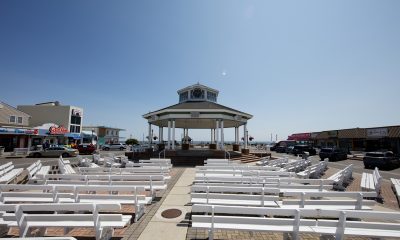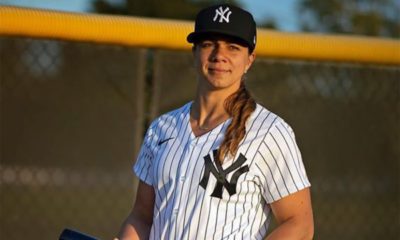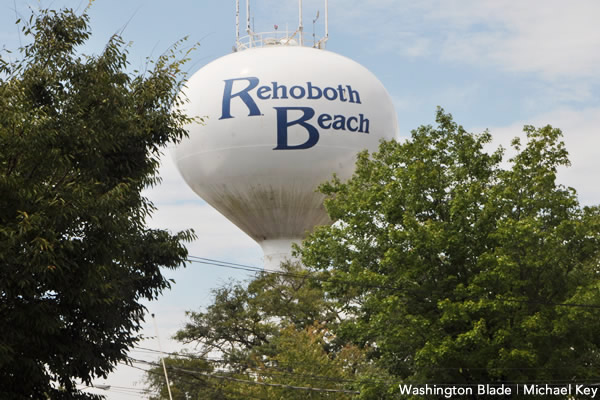Sports
Slugger’s journey to coming out
Former Orioles minor league all-star Tyler Townsend on life in baseball’s closet and finding redemption in helping others
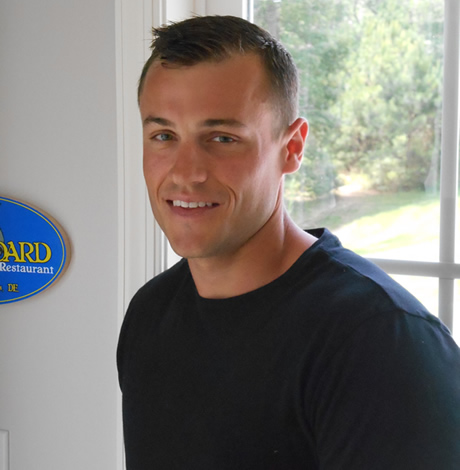
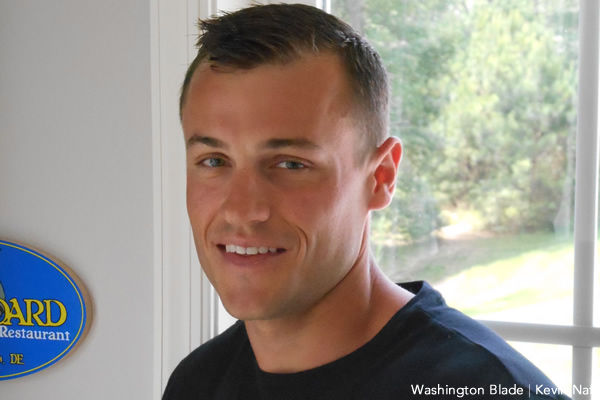
Today, Tyler Townsend has left baseball behind and is pursuing a degree in hospitality management. (Blade photo by Kevin Naff)
If not for a recurring hamstring injury, Tyler Townsend just might have become Major League Baseball’s first openly gay player.
Townsend, now 27, was drafted by the Baltimore Orioles in 2010 in the third round, opted out of his senior year at Florida International University and entered the minor league system.
An all-star first baseman, he quickly progressed through the system, playing stints in Aberdeen, Frederick and Salisbury, all within the Orioles operation. And through three years of minor league ball, Townsend played from the closet, keeping his sexual orientation a secret from teammates, coaches — and the female fans who followed the team and offered phone numbers to players.
“I was afraid of what would be said by teammates and fans,” he said in an interview with the Blade from his home in Rehoboth Beach, Del. “I always had a goal of getting to professional baseball since I realized I had the ability to do it and I just didn’t want anything to take away from that. I didn’t want the person who didn’t understand it to not give me a chance because they didn’t want to deal with my personal life. That was my fear. And there wasn’t anybody to look up to who was out playing sports.”
Despite his apprehension, Townsend said his plan all along was to delay coming out publicly until he made it to the big leagues.
“I would have come out if I’d made it to the pros,” he said, with a hint of regret.
For someone coming out publicly in the media for the first time, Townsend is relaxed and poised, reclining slightly in the well-appointed living room of the townhouse he shares with his partner not far from Rehoboth’s beaches.
His story rings familiar to legions of gay people who are — or were — out in their personal lives, but closeted at work. He had a boyfriend and lived in D.C. when not on the road, living an openly gay life, though he didn’t frequent gay bars. But when it was time to play ball, Townsend dodged questions about his sexual orientation — and why he never called those women who hit on him. His boyfriend at the time, who was older, attended games as his “uncle.”
“I was out in the off-season, so six months of the year I was happy and out and being myself and once spring training came around it was back in the closet,” he said. “I should have done things differently but I feel like telling this story now makes up for it a little bit.”
Townsend, like so many American boys, started playing baseball at age 10, joining a Delaware travel team and continuing through his high school years at Cape Henlopen High outside of Rehoboth, where he grew up. Rehoboth is a popular beach destination for gays from Baltimore, D.C. and Philadelphia, so Townsend was no stranger to the sight of two men holding hands.
“I always knew I was gay,” he said. “And growing up in Rehoboth, I knew what gay was. Once I realized I was attracted to other guys, I knew right away what it was.”
After earning a college scholarship and playing three years for Florida International, Townsend realized every little league player’s dream.
“To hear your name on TV on draft day is one of the best memories, it’s what I worked for my whole life,” he said. “Nothing else mattered.”
But the euphoria of that moment soon gave way to the harsh realities of a career in pro sports — long stints away from home, injuries and, for Townsend, the pressure of guarding his secret. After being drafted by the Orioles and signing his contract, Townsend played advanced rookie ball in Aberdeen, Md., then went to Pensacola, Fla., for training in the off season. That’s when he first tore his hamstring doing sprints, which led to continuous struggles with injury.
That’s also when he decided to start the coming out process by telling his family.
“I just couldn’t live with it anymore,” he said. “I thought the whole world was going to be against me. I couldn’t live with the lie anymore so I decided to tell my family and that was it.”
His family, which includes his mother of Lewes, Del., father of Georgetown, Del., a sister, half brother and half sister, proved supportive and accepting. “I was in Miami when I told my Dad and he got in the car and drove down to make sure I was OK.”
Locker room epithets
The acceptance he found off the field didn’t translate to the locker room, where homophobic epithets were commonplace and where he feared coming out would doom his chances of playing in the big leagues.
“So many times, I heard homophobic remarks in locker rooms but didn’t say anything because if I get to the position where they’re going to call me up and it’s between me and somebody else, I didn’t want the person making the decision saying, ‘I don’t want to deal with the publicity or the discomfort of other players,’” he said. “I didn’t want anything to hinder my chances and being openly gay would have hurt.”
He recalled one teammate who was religious and read the Bible every day, who told Townsend there’s nothing wrong with being gay as long as you don’t act on it. Another time, he said a coach called a player a faggot because he touched his belt. And at spring training in Florida, Townsend said an older gay man would often come to games and bring bubble gum and snacks for the players. On his birthday one year, the coaches joked about taking a video of the team in the shower and giving it to the man as a gift.
“Little things like that always made me realize there was no room for an openly gay player,” Townsend said. “If they’re that uncomfortable with the idea of someone being gay, what would their reaction be if they actually had to take a shower or change or play or trust someone on their team who’s gay?”
As a result, he never came out to anyone on the team, though one locker room incident brought him close. There was a man in North Carolina, Townsend said, who would sneak into locker rooms and impersonate cleaning staff while spying on players getting undressed. When someone finally caught on and kicked him out, the mood in the locker room turned angry, with players using anti-gay epithets and threatening to beat the man. According to Townsend, one player said, “I don’t care how close I am to somebody if I ever found out they were gay I would disown them.”
The threats of physical violence prompted Townsend to speak up, challenging his teammates, who demanded to know why he was defending the trespasser.
“I told them they were doing something stupid — it was the one time I spoke out,” he said. “People are ignorant and maybe it would have been different if I came out but I just felt that the majority of them had a preconceived notion of what all gay men are and it wouldn’t matter.”
After battling the hamstring injuries for most of his professional career, Townsend finally accepted that he needed a break in 2013.
“It was discouraging. It was one of the two toughest decisions I’ve had to make — leaving baseball and coming out.”
‘There’s still a lot of hatred’
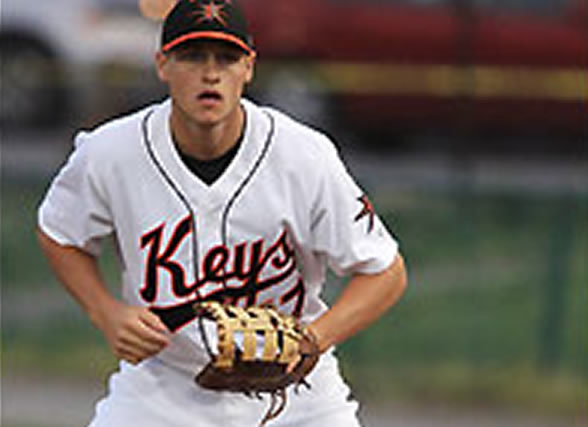
Tyler Townsend played in the minor league system after being drafted by the Baltimore Orioles in 2010. (Photo courtesy Frederick Keys)
Major League Baseball has never had an openly gay active player. The NBA had Jason Collins, who came out in 2013 and played briefly before retiring. The NFL had Michael Sam, who was drafted but failed to make a team and just last week quit the Canadian Football League, citing mental health issues. Publicly at least, Collins and Sam were heralded in the media and showered with attention — Oprah interviews, Sports Illustrated covers — all the trappings of a carefully orchestrated modern-day coming out story aimed at downplaying criticism and maximizing endorsement and speaking engagement potential. Anyone who tweeted their disgust with the newly out players was quickly reprimanded and the offending tweet deleted.
Just this week, David Denson, a minor league player with the Milwaukee Brewers system, came out as gay. He told the Milwaukee Journal Sentinel that his teammates on the Helena Brewers accept him. Maybe he’ll make it to the big leagues and become the first active out gay player, overcoming the skepticism of many observers who see baseball as the last frontier for gay athletes.
“Sports in general has that macho persona that you need to put out,” Townsend said. “Baseball is 85 percent players from conservative areas like Latin America and the Bible Belt and you have 18-year-old kids who’ve never been exposed to anything.”
The view that baseball will be the last major pro male team sport to have an out gay player is common among sports fans the Blade has spoken to about the subject. To help address the problem of homophobia in baseball, MLB hired gay retired player Billy Bean as its first “Ambassador of Inclusion.” Bean counseled Denson on coming out.
“The beauty of what could come from this is he can be an example that can help change that perception and change the stereotype that there would never be a gay person on a men’s professional sports team,” Bean told the Journal Sentinel. “That was something I struggled with.”
Townsend said he also turned to Bean for help with coming out publicly.
“Billy Bean has been a help, but he couldn’t come out either and it’s the same in 2010 as it was in the ‘80s,” he said. “ The locker room is a free-for-all, there’s still a lot of hatred and something needs to be done about it.”
So what’s to be done? Townsend cites sensitivity training for coaching staff as key, because younger players are emboldened when they hear coaches using homophobic epithets. The other solution, he says, is more out gays in the game. “We need someone like Jackie Robinson to break that barrier.”
Today, Townsend has mostly left baseball behind, though he recently played in a softball tournament. He’s resumed his studies at Florida International University, pursuing a degree in hospitality management. He works part-time as a bartender in Rehoboth and hopes to one day open a restaurant of his own.
He met his partner, David Gonce, a regional sales director for an information document managing company, about a year and a half ago in Dewey Beach, Del. The two exchanged glances at the Starboard, a bar and restaurant popular with the straight college crowd. But Gonce thought Townsend was checking out the female friend who was with him.
“I asked the waitress if he wanted to meet my buddy’s girlfriend and she said, ‘No, he’s gay and he’s looking at you.’”
They started dating shortly after and now, 18 months later, a plaque of the Starboard’s logo hangs in their living room.
“It’s got to be really difficult to suppress who you are in front of all these people you’ve gotten to know so well for such a long period of time playing baseball,” Gonce said. “I give him a lot of credit for doing that, it’s very difficult.”
Reflecting on his years in professional baseball and just how close he came to the majors, Townsend betrays some regret.
“It’s sad looking back now, I wish I could have been that person but I didn’t have the courage at the time,” he said. “That’s not right on my part … I would do it differently if I could. There’s that 16-year-old kid, I want him to know not to be scared and don’t let other people steer you away from who you are.”
He added that he’s still friends with some players on Facebook and isn’t sure how they’ll react to this interview but that he no longer cares.
“This is my way of letting the guilt go, so I’m doing this for me and for people who are struggling with the same things I struggled with to try to help them. My regret was not coming out sooner and being that role model for somebody but I still have the passion to help.”
Sports
Brittney Griner, wife expecting first child
WNBA star released from Russian gulag in December 2022
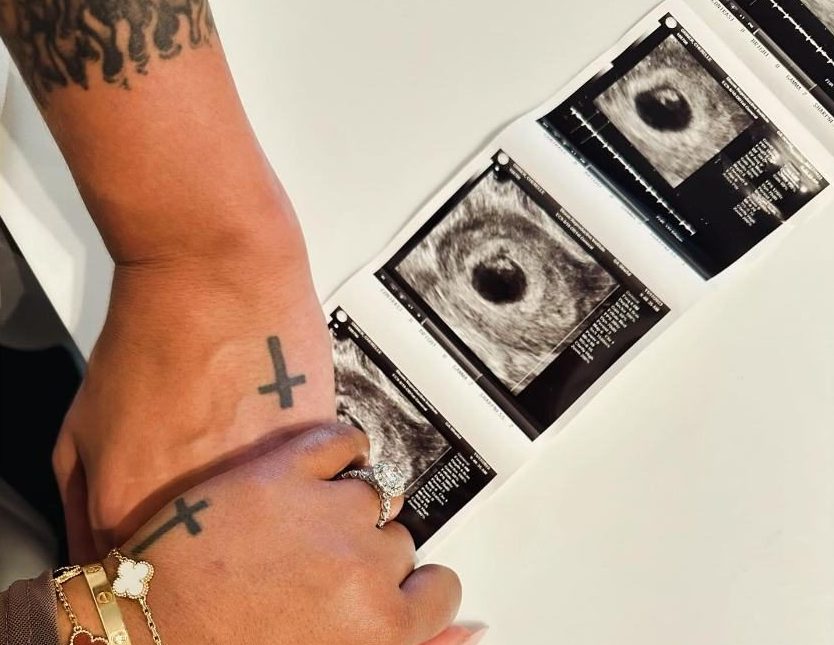
One year after returning to the WNBA after her release from a Russian gulag and declaring, “I’m never playing overseas again,” Phoenix Mercury star Brittney Griner and her wife announced they have something even bigger coming up this summer.
Cherelle, 31, and Brittney, 33, are expecting their first child in July. The couple shared the news with their 715,000 followers on Instagram.
“Can’t believe we’re less than three months away from meeting our favorite human being,” the caption read, with the hashtag, #BabyGrinerComingSoon and #July2024.
Griner returned to the U.S. in December 2022 in a prisoner swap, more than nine months after being arrested in Moscow for possession of vape cartridges containing prescription cannabis.
In April 2023, at her first news conference following her release, the two-time Olympic gold medalist made only one exception to her vow to never play overseas again: To return to the Summer Olympic Games, which will be played in Paris starting in July, the same month “Baby Griner” is due. “The only time I would want to would be to represent the USA,” she said last year.
Given that the unrestricted free agent is on the roster of both Team USA and her WNBA team, it’s not immediately clear where Griner will be when their first child arrives.
The Griners purchased their “forever home” in Phoenix just last year.
“Phoenix is home,” Griner said at the Mercury’s end-of-season media day, according to ESPN. “Me and my wife literally just got a place. This is it.”
As the Los Angeles Blade reported last December, Griner is working with Good Morning America anchor Robin Roberts — like Griner, a married lesbian — on an ESPN television documentary as well as a television series for ABC about her life story. Cherelle is executive producer of these projects.
Next month, Griner’s tell-all memoir of her Russian incarceration will be published by Penguin Random House. It’s titled “Coming Home” and the hardcover hits bookstores on May 7.
Sports
Applause and criticism for Staley’s trans-inclusive stance
South Carolina Gamecocks women’s coach made comments on Sunday
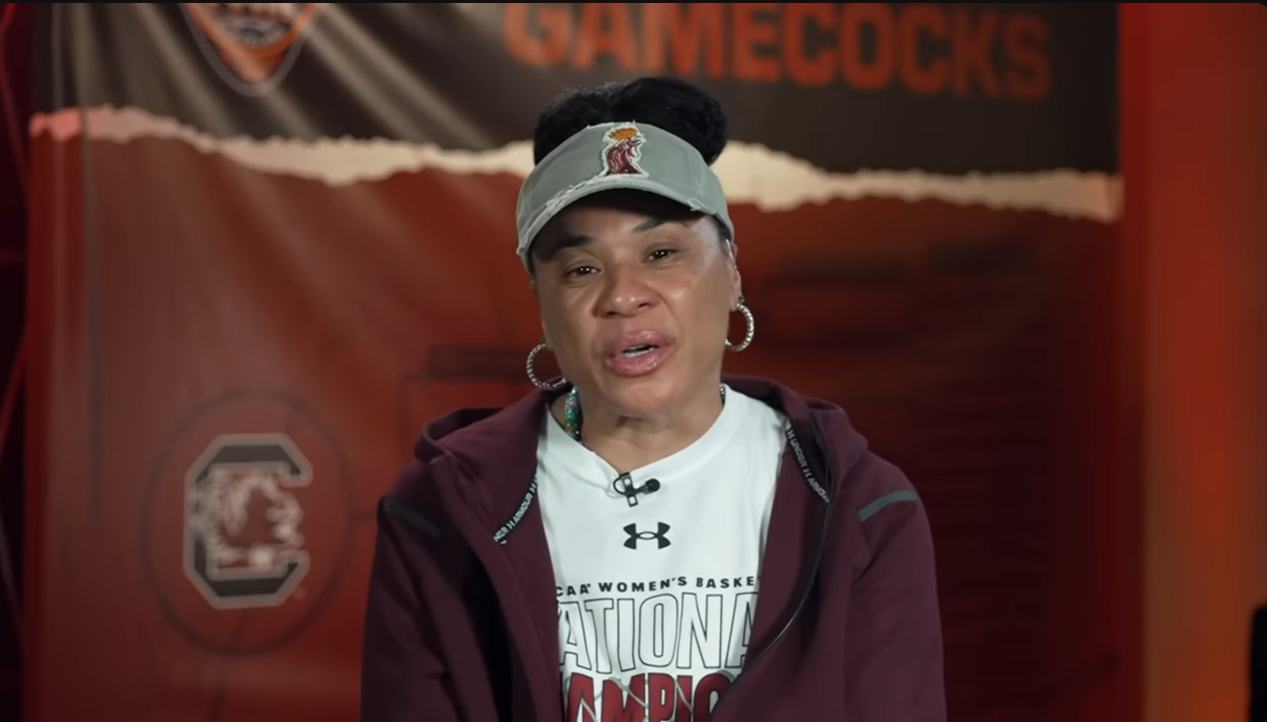
If not for a conservative transphobic blogger, this moment should be a celebration of NCAA women’s basketball coach Dawn Staley and the women of the South Carolina Gamecocks.
On Sunday, they concluded their undefeated season with a decisive win and a championship title. But when Staley faced reporters before that big game, Outkick’s Dan Zakheske asked her an irrelevant, clickbait question about transgender women in sports, referring to them as “biological males.”
Staley could have ignored the question, or stated she had no opinion, but instead the legendary coach offered a crystal clear endorsement of trans women competing in women’s sports, something outlawed in her home state of South Carolina for girls in kindergarten through college.
“I’m of the opinion,” said Staley, “If you’re a woman, you should play. If you consider yourself a woman and you want to play sports or vice versa, you should be able to play. That’s my opinion.”
Zakheske clearly wasn’t satisfied with that declaration of allyship and Staley swiftly cut him off.
“You want me to go deeper?” she asked.
“Do you think transgender women should be able to participate,” he started to say, when the coach stole the ball and took it downtown on a fastbreak. “That’s the question you want to ask? I’ll give you that. Yes. Yes. So, now the barnstormer people are going to flood my timeline and be a distraction to me on one of the biggest days of our game, and I’m okay with that. I really am.”
Staley is herself a Hall of Fame player a leading voice for diversity.
Reaction to her comments were swift, from LGBTQ rights organizations, athletes and inclusion opponents.
“Coach Staley simply spoke the truth that trans women are women and should play if they want,” said Sarah Kate Ellis, president and CEO of GLAAD, in a post on Instagram. “All of us can take a page from Coach Staley’s playbook as a sports leader and as a person of high integrity guided by faith, compassion and common sense.”
A White House pool reporter revealed President Joe Biden called Staley Sunday evening to congratulate her and the Gamecocks on their championship win. But it’s not clear if she and the president, an outspoken supporter of trans rights, discussed her remarks on trans athletes.
A number of Black leaders in the LGBTQ movement applauded Staley for taking a stand.
“Coach Staley has always been a trailblazer, but she’s also shown that true leadership is about advancing justice and equality for everyone,” said Human Rights Campaign President Kelley Robinson. “By expressing her full-throated support for transgender athletes’ inclusion in sports, she’s sending an important message — our shared humanity matters.
“Coach Staley showed courage and vulnerability, in choosing to answer the question and make a powerful statement of support for trans people on one of the biggest days and biggest stages in sports history,” said Kierra Johnson, executive director of the National LGBTQ Task Force, in a statement. “Not only does that make her a leader we can all aspire to like, it makes her a class act. She has etched her legacy in the history books with her play, her coaching, her heart and her smarts.”
In congratulating Staley on her championship title victory, Dr. David J. Johns, the CEO and executive director of the National Black Justice Coalition, also commended her for “her unwavering advocacy and support for transgender people in sports.”
“In a time when transgender athetes face unjust scrutiny, discrimination and exclusion from the National Association of Intercollegiate Athletics, her courage to speak truth to power and in support of inclusion and fairness sets a powerful example for us all, and is a testament to her integrity and compassion.”
The NBJC leader was referring to Monday’s announcement by the NAIA, the governing body of athletic programs at small colleges nationwide, voting 20-0 to essentially ban trans women from competing with other women beginning Aug. 1, as ESPN reported.
“It is a shocking and devastating development that the NAIA, an organization that has done so much to open doors, is now slamming those doors shut on transgender athletes,” said Sasha Buchert, Lambda Legal’s senior attorney and director of the organization’s nonbinary and trans rights project.
“Instead of standing up in support of transgender young people, the NAIA has simply turned its back on them — permanently depriving them of the benefits of competition. Would that they had the courage of victorious University of South Carolina women’s basketball coach Dawn Staley, who didn’t miss a beat in clarifying that transgender women should be able to play.”
However, praise for Staley’s stance was not universal.
Riley Gaines, failed former college swimmer and paid shill for the anti-inclusion organization, Independent Women’s Forum, called Staley “entirely incompetent or a sell-out” on Fox News. “Personally, I don’t think she believes what she said.”
Gaines has turned her fifth-place tie with out trans NCAA champion Lia Thomas into a career as a crusader against inclusion and a former advisor to the presidential campaign of Florida Gov. Ron DeSantis.
Val Whiting, a former Stanford University and professional women’s basketball player, tweeted her strong disagreement with Staley. “A lot of my basketball sisters feel differently but trans women do not belong in women’s sports. It’s not fair nor safe for biological women. There has to be another solution for trans women to be able to compete athletically besides having them compete against biological women.”
A lot of my basketball sisters feel differently but trans women do not belong in women’s sports. It’s not fair nor safe for biological women. There has to be another solution for trans women to be able to compete athletically besides having them compete against biological women.
— Val Whiting (@iamcoachval) April 7, 2024
Zaksheske’s Outkick colleague, anti-trans pundit David Hookstead, also went all-in with a transphobic post.
“Dawn Staley says she supports men who identify as women competing against real women in sports. Her view could literally destroy women’s basketball forever. Why won’t more people stand up for women?”
Dawn Staley says she supports men who identify as women competing against real women in sports.
— David Hookstead (@dhookstead) April 6, 2024
Her view could literally destroy women’s basketball forever.
Why won’t more people stand up for women? pic.twitter.com/2A59KTqvHb
Hookstead then boasted that Staley blocked his account.
Republican South Carolina Congresswoman Nancy Mace retweeted Zaksheske’s account of his interaction with Staley, calling her support of trans athletes “absolute lunacy.” That in turn won praise from Caitlyn Jenner, who retweeted Whiting and posted her thanks to Mace, along with this comment: “There is nothing complicated about this issue!”
What is complicated is that Jenner has never explained why she has competed with cisgender women in golf ever since her transition almost a decade ago.
You’re a hypocrite. pic.twitter.com/42DKwA9jmF
— Art Candee 🍿🥤 (@ArtCandee) April 7, 2024
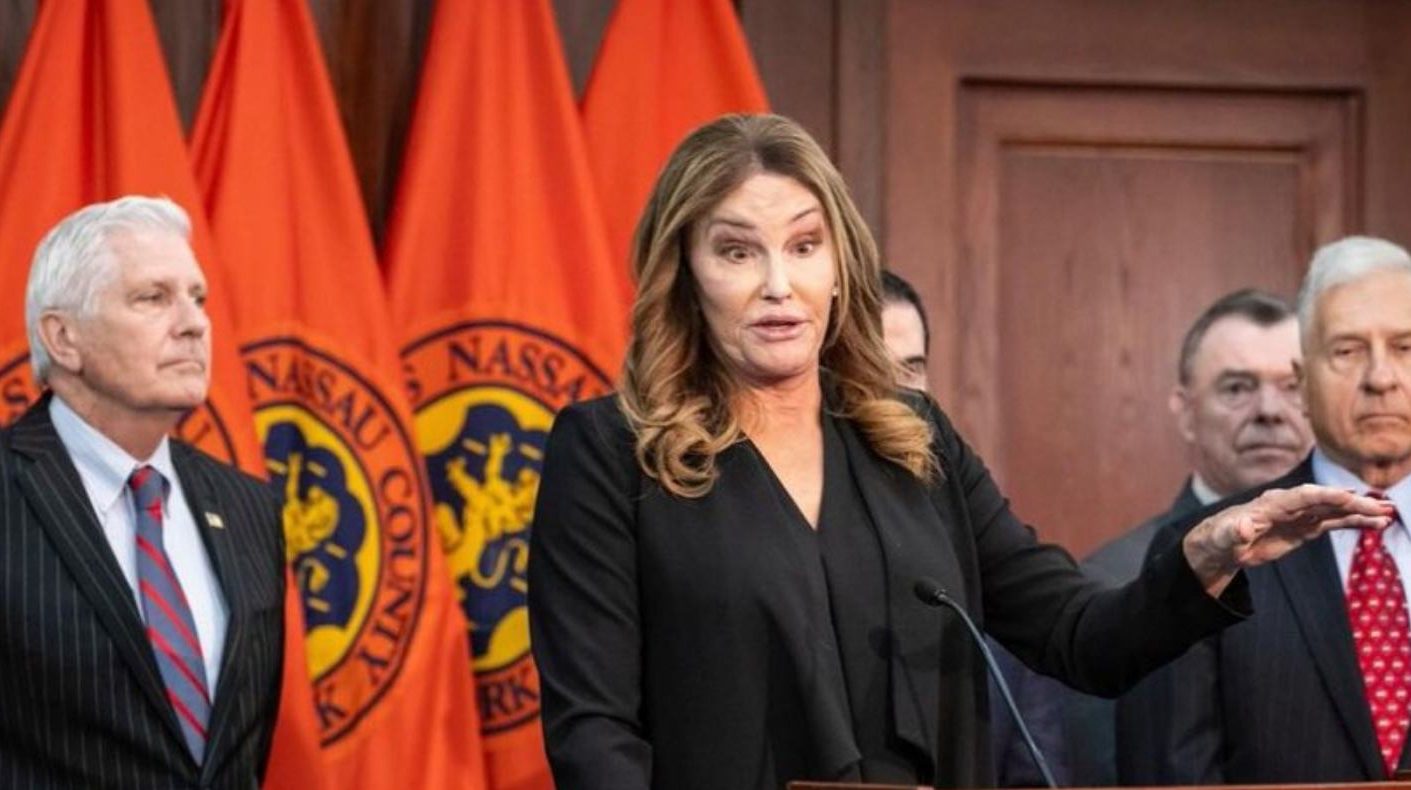
Caitlyn Jenner flew from Malibu to New York this week to join her fellow Republicans in their nationwide quest to keep transgender girls and women from competing in sports with other women.
“Let’s stop it now while we can,” said the Olympic gold medalist, at a news conference carried live by Fox News Channel.
Republican Nassau County Executive Bruce Blakeman organized the event so that Jenner could speak in support of his February executive order banning trans athletes at more than 100 county-owned facilities.
“Trans women are competing against women, taking valuable opportunities for the long-protected class under Title IX and causing physical harm,” said Jenner without providing supportive evidence of her claim. Jenner said the ban would defeat “the woke agenda.”
Her comments drew praise from former NCAA swimmer and paid shill Riley Gaines, who represents the Independent Women’s Forum and has also worked with the failed presidential campaign of Republican Gov. Ron DeSantis of Florida on his anti-trans athlete platform.
We stand with Executive Blakeman as he faces shameful retaliation from @TishJames for merely protecting sports on the basis of sex
— Riley Gaines (@Riley_Gaines_) March 18, 2024
Thanks to you both, @Caitlyn_Jenner @NassauExec !!👏🏼 https://t.co/vAsWfayI7l
“If the left wants to fight this battle on this hill, it’s a losing battle,” said Jenner. “We will win the battle.” She claimed she spoke on behalf of women and girls, contradicting her past statements in support of trans girls competing according to their gender identity and despite the fact she herself still competes in women’s sports.
Shortly after the ban was announced last month, New York State Attorney General Letitia James and New York Gov. Kathy Hochul, both Democrats, denounced it and accused Blakeman of “bullying trans kids.”
James called the order “transphobic and deeply dangerous,” and argued that it violates the state’s anti-discrimination laws. The state attorney general challenged it in court March 1 with a “cease and desist letter,” demanding that Blakeman rescind the order, saying it subjects women’s and girls’ sports teams to “invasive questioning.”
As the Los Angeles Blade reported, Blakeman’s legal team countered with its own lawsuit on March 5, claiming her cease and desist letter violates the 14th Amendment’s equal protection clause.
“Not only was the executive order legal, but we had an obligation to defend it,” Blakeman said Monday.
The order has also been challenged by the New York Civil Liberties Union, which filed suit last week on behalf of a women’s roller derby league based in Nassau County that welcomes trans women and would be barred from using the county’s facilities by Blakeman’s executive order.
Just days before the Long Island news conference, Jenner joined Olympian Sharron Davies, who also campaigns against trans inclusion in sports, for an conversation with a British newspaper, the Telegraph, which has been outspoken against trans inclusion.
They recalled that in their day, tests to determine sex were mandatory in order to compete, and Jenner said she has been “pushing” for sex tests to return to sports, decades after sports organizations around the world abandoned the practice because they were unreliable. “If they continue down this road, it will be pretty much the end of women’s sport as we know it.”
“I can still hit a golf ball 280 yards,” Jenner continued, not mentioning she plays from the ladies’ tee. She did however opine about not being “a real woman,” acknowledging that many trans women disagree with her view.
“They keep saying, ‘Oh, I’m a real woman, I’m a real woman,’ and I’m going, ‘No, you’re not,’” said Jenner. “I will use your preferred pronouns, I will treat you as a female, you can run and dress and do whatever you want, I have nothing against that, it’s fine, but biologically you’re still male.”
She added: “Let me explain — I am biologically male, OK? I’m XY. There’s nothing I can do to change that. If you believe in gender dysphoria, and I think most people do realize it’s not a disease, it’s a mental condition, just like some people are left-handed and some people are right-handed, it’s kind of the way you’re born and I’ve dealt with it my entire life.“
“I consider myself a trans person, I am still genetically male, I changed all of my ID right down to my birth certificate so technically yes, I am female, but on the other hand I know I’m not.”

